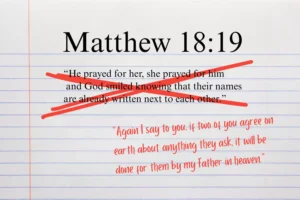It was New Year’s Eve, and the 10 of us gathered in the living room for dessert. We began reflecting on the year that was in now its closing hours.
Each couple took turns reviewing highs and lows of the year. For the most part, it had been a good year. Bigger and better opportunities, unexpected financial success, the birth of healthy children and the accelerated elimination of debt were some of the items on the good list.
But it had also been an exceptionally challenging year. Things had happened that now cast a shadow of uncertainty on what the next year would hold.
Everything was good now, but how long would it continue? Would the things that had gone awry last year create repercussions that would undermine all the things we had held so dearly? For some, the fear of losing the jobs they loved was becoming a distinct possibility. For others, sickness continued to weaken a body and haunt the hope of future happiness.
The foundations—both people and institutions—we had grown to rely on had been shaken, and because of it the house we had called home began to feel like a hotel we would soon have to check out of. The reality of how sudden a curve in the road can appear was sobering us.
As I sat there, I began to ask myself a question that I would have never dared to ask before: What if Jesus has a different goal for my life than I do?
Reconsidering goals
Time-out. This was not a conversion moment for me. I’ve always been an ardent follower of Christ. This was not a crisis of purpose moment. I was then and am now a pastor. I’ve worked at the same church for the better part of a decade. I’ve never made a major decision in my life without prayer or counsel from Godly leaders. When I began to question if Jesus and I had the same goals, I’m not talking about the kind of goals that have to do with career moves or a life’s work.
It was a little bigger than that.
I’m talking about goals as in a general direction, as in the goal of progress, improvement, the thing we call success, the goals of getting more, doing more, being more, the goals of moving upward, forward, and onward. You see, I had been accustomed to a Jesus who cooperates with me and those goals, the Jesus who wants me to have more open doors, more stuff and more happy experiences.
As I sat there and asked myself that question on New Year’s Eve, I realized that I had just begun to see Jesus again. Not a Jesus who wants to make me miserable or poor because that’s somehow more noble or pure. But also not a Jesus who automatically works for my general advancement and improvement in this world. Not a Jesus of sadistic intentions, but also not a Jesus of suburban values.
Seeing Jesus anew
I’ve begun to see the Jesus of the Gospels, who came to turn the understood notion of religion and how it works on its head; the Jesus who forced people to reconsider their rationale for their routines; the Jesus who challenged values and socially accepted vices and virtues.
This is a subversive Jesus. This is a King whose humble birth and friendly demeanor concealed His true agenda of ruling our lives. And He won’t stop until He has every part of our hearts.
I’ve said that before, but I’m starting to realize what that might really mean. It means He will do everything in His power—everything—to make us His. So, if giving us stuff achieves that goal, then so be it. But if taking away stuff gets us there quicker, He just may opt for that route. He’s our friend in the way that we have never fully understood a friend to be—one who will act for our good even when we don’t see it as good.
Needless to say, none of this was consoling me as I sat there in my living room with my friends.
My thoughts were halted as another question was raised: Are any of us closer to Jesus today than we were when this year began?
It was a question borrowed from Henry Nouwen’s book, In the Name of Jesus. Nouwen describes an evaluation of his own heart as he stood at the threshold of ministry burnout despite the apparent success that surrounded him. His words are cutting in their truth: Burnout is “a convenient psychological translation for a spiritual death.”
Nouwen’s own quest to return to the heart of Christ led him to leave his position of prominence as an eminent religion professor at Harvard and take residence with mentally handicapped adults at Le Arche.
Asking honest questions
Once again, I was staring down a question that did not console or offer hope as I was used to recognizing it. Both of these questions provoked me, created more unrest. That’s too tame. They wrecked me to the core. They bore into my soul like a giant drill, exposing a core I had not seen—or was too ashamed to admit was me.
I loved my life. I loved my job, and all the success and recognition and opportunities that came with it. I valued the influence, appreciated the stability, and banked on my potential—literally.
But in the midst of all of those wonderful things, had my relationship with Christ, the Person, been deepened? I hadn’t backslidden, or “let my love grow cold,” but did I really engage the living Christ more intimately than I had the previous year?
Asking a Christ-follower if they’re satisfied with their relationship with God is like asking a millionaire if he has enough money. There’s always more to be had. All of us can spend more time with our kids, make more money, or read the Bible more. But what I was wrestling with that New Year’s Eve was not better systems or schedules, or time-management strategies, or proactive habits of prioritization. It was a profound moment of coming to grips with a truth that gave both the questions their edge: Christ is after me. He is after me completely, and He won’t stop until He has me.
And He is after you.
For all the blessings, opportunities, healings, miracles, provisions, protections, and stability that He has given you, there’s one thing that He values more, one thing that He would trade all of the above for: you.
And that’s precisely what makes our faith in Christ so unexpectedly subversive to our own agenda. This faith that we’ve embraced, this Life that we have taken into our hearts, will be our undoing. And it means to be that. It’s designed to be the end of us. The Jesus I’ve come to see and know at work in my life is the One who comes to undermine my own small-minded and wrong-headed plans. He is the Trojan Horse of blessing that we readily welcome into our hearts without knowing His mission to destroy us. For He has not come to bring peace, but a sword. This is the subversive Christ.
But this subversion is the means to His ends. In our death, we find His life. In our surrender, we find His sovereignty.
So, if you haven’t yet experienced the doors of the great wooden horse bursting open with warriors bent on your defeat, wait. It’s coming. And when it does, when Christ comes to save your life by making you lose it, embrace Him. Embrace Him again as you did at first when you thought Christianity was all about your happiness. Embrace His work. Count it all joy. It will save your life. Again.
Copyright 2008 Glenn Packiam. All rights reserved.











